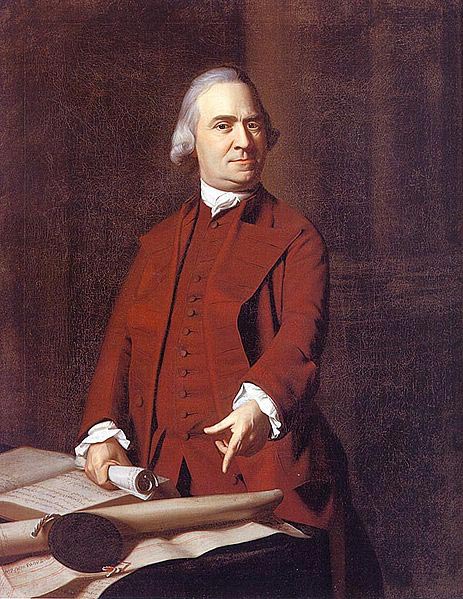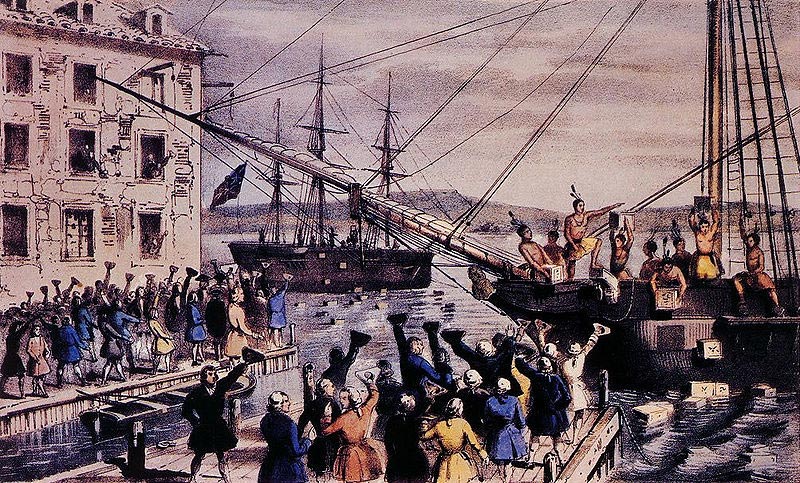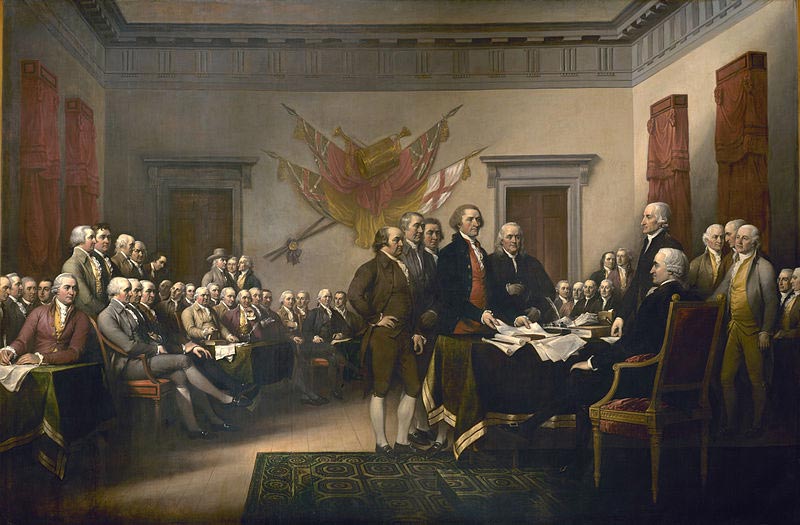 Samuel Adams was born in Boston on September 27, 1722. He was the son of a brewer and merchant who was active in Boston politics and his mother was a strongly religious woman. Young Samuel attended Harvard and briefly studied law and eventually went to work collecting taxes. He used his knowledge of tax codes to be of help to the Boston merchants.
Samuel Adams was born in Boston on September 27, 1722. He was the son of a brewer and merchant who was active in Boston politics and his mother was a strongly religious woman. Young Samuel attended Harvard and briefly studied law and eventually went to work collecting taxes. He used his knowledge of tax codes to be of help to the Boston merchants.
As Samuel became more involved in politics he spent a lot of time as an agitator for the resistance. Being a very visible and popular man, Adams was elected to the Massachusetts Assembly in 1765. It was while working as a clerk in the assembly that he first proposed a Continental Congress.
Samuel Adams was an American statesman and one of the founding fathers of our nation who was quite popular with the common people. He and his cousin John Adams were often mistaken for brothers. They maintained a very close relationship throughout their lives. Samuel was the second cousin of John Adams who was to eventually follow George Washington as President of the newly formed United States.
Childhood
When Samuel was a child he had 12 siblings. Only two of the siblings would live past the age of three. As a youngster Samuel attended the Boston Latin School where he studied Greek and Latin. At age 14 Samuel entered Harvard where he earned his Bachelor’s and Master’s Degrees.
Personal Life
In 1749 Adams married Elizabeth Checkley. They had a total of six children but just two survived to adulthood. Their names were Samuel and Elizabeth after their parents. Samuels’s wife died in child birth while delivering a stillborn baby in 1757. Samuel was married a second time in 1764 to Elizabeth Wells. Adams’ second wife was a very good manger of the household and finances and this left more time for Samuel to become involved in politics, which he had a great interest in.
Early Career
Samuel tried to venture into business but was unsuccessful. He also worked in a counting house but found that his math skills were not proficient enough for the job and he was fired for his inefficiency. After several unsuccessful attempts at business, Samuel Adams eventually became a tax collector in 1756. He continued in this position for about 12 years. Samuel was not a very diligent or efficient collector but he did use the position to build a special bond with the merchants in Boston.
Samuel discovered that he had a talent for writing. Because of his writings he became well-known and was soon actively participating in the local political activity. He was a prominent figure at town hall meetings and became a well-liked leader of informal political groups. He was soon considered a leading patriot.
Revolutionary Activities
After the French Indian war, Britain decided to increase taxes in the colonies to offset the war costs. The three taxes that Adams was most opposed to consisted of the Sugar Act which was implemented in 1764, the Stamp Act that took place in 1756 and the Infamous Townshend Acts that were levied in 1767. Adams believed that increasing taxes on the colonies would eventually bring more tyranny.
Adams wrote a series of newspaper articles that fanned the flames of the reader’s anger towards British tyranny. He was outspoken in his articles about his belief that more tyranny was coming if the colonies did not resist the increased taxation.
 Samuel was able to use his position as clerk at both the Boston meetings and the state House of Representatives to draft protest letters and petitions rebuking the British Parliament for the increasing taxes. He also called for the boycott of English goods as a form of protest. On December 16, 1773, Adams gave a rousing speech at a local meeting and that night men disguised as Indians boarded three British Tea ships in the Boston Harbor and threw the tea overboard. This event was to become known as the famous Boston Tea Party. In response, the British closed down the harbor and restricted town meetings to only one meeting each year.
Samuel was able to use his position as clerk at both the Boston meetings and the state House of Representatives to draft protest letters and petitions rebuking the British Parliament for the increasing taxes. He also called for the boycott of English goods as a form of protest. On December 16, 1773, Adams gave a rousing speech at a local meeting and that night men disguised as Indians boarded three British Tea ships in the Boston Harbor and threw the tea overboard. This event was to become known as the famous Boston Tea Party. In response, the British closed down the harbor and restricted town meetings to only one meeting each year.
In 1774, Adams became a State delegate to the Continental Congress held in Philadelphia. It was then that he helped to draw up the draft of the original Declaration of Rights. In 1775, Adams attended the 2nd Continental Congress and was a forceful advocate of Independence. He was also an appointed member of the board of war. Adams continued to serve his country during the American Revolution with all the fire and zeal he had in Boston. When the war was won and his country was finally free, Samuel Adams returned to Boston in 1781 to find that his home had be ransacked and plundered by British troops. He took some time to gather what was left and repair what damage he could. When his son, Doctor Adams, died a premature death, he left Samuel a comfortable estate.
The Later Years
 During the final years of his life, Samuel Adams was elected to serve in the Massachusetts Senate and was elected lieutenant governor before finally being elected governor. As an advocate for public virtue, Adams was very instrumental in getting the state of Massachusetts to provide free public education for both boys and girls. He was also a charter member of the Academy of Arts and Sciences.
During the final years of his life, Samuel Adams was elected to serve in the Massachusetts Senate and was elected lieutenant governor before finally being elected governor. As an advocate for public virtue, Adams was very instrumental in getting the state of Massachusetts to provide free public education for both boys and girls. He was also a charter member of the Academy of Arts and Sciences.
Adams was a member of the ratifying committee for the state of Massachusetts when the Constitution of the newly formed nation was going through the process of being ratified by the states. He was the force behind the efforts that resulted in what we now know as our Bill of Rights. Although Adams was not a great supporter of the new Constitution at first, he later became a strong advocate and supporter.
Samuel Adams retired from politics in 1797. This remarkable man was regarded by many as one of the most prominent leaders of the revolution that resulted in the birth of the United States. Thomas Jefferson referred to Adams as “truly a man of the revolution.”
Samuel Adams died on October 2, 1803. He was 81 years old. The patriot was buried at the Granary Burying ground in Boston. In a Boston newspaper called the Independent Chronicle, he was eulogized as the father of the revolution.